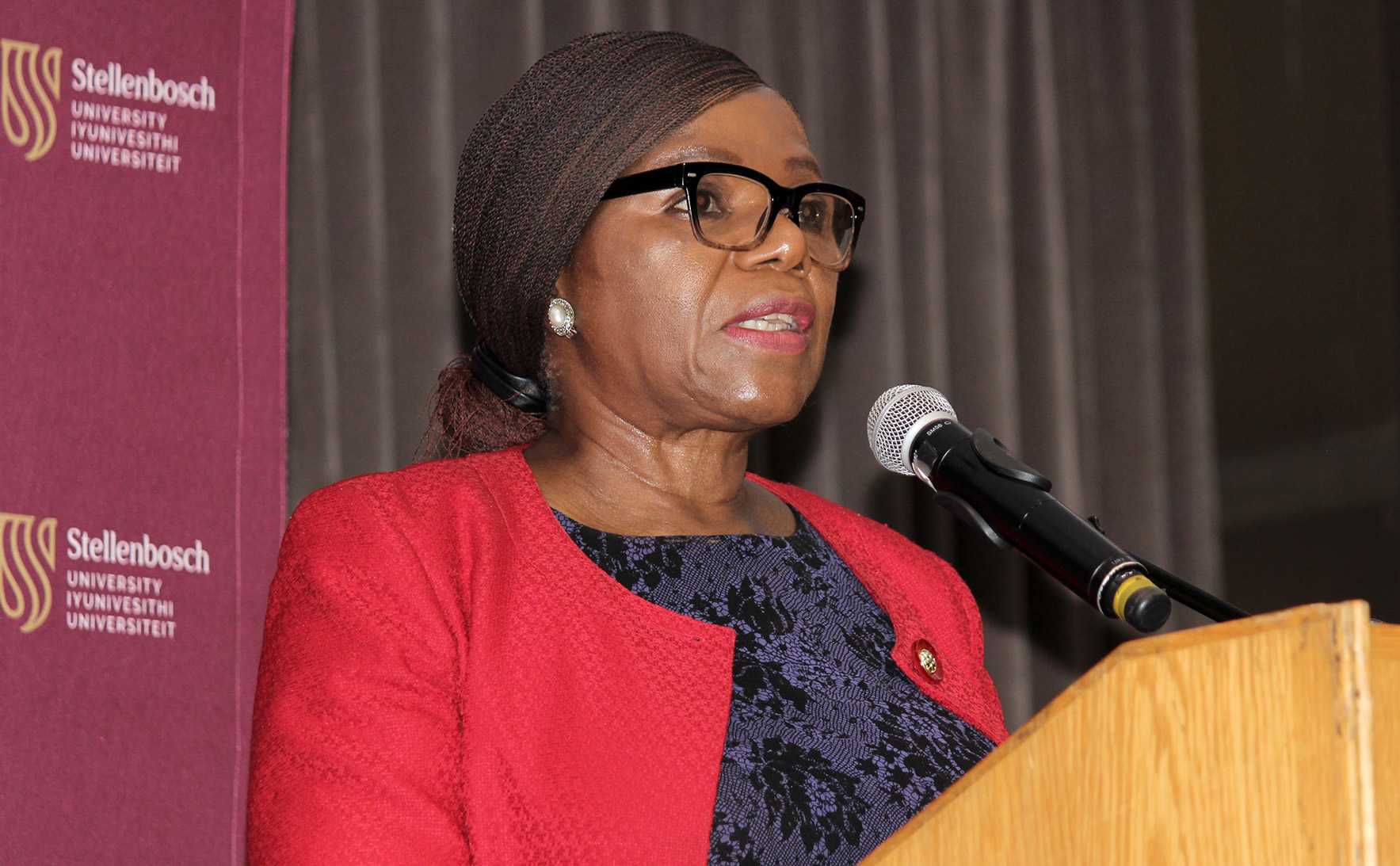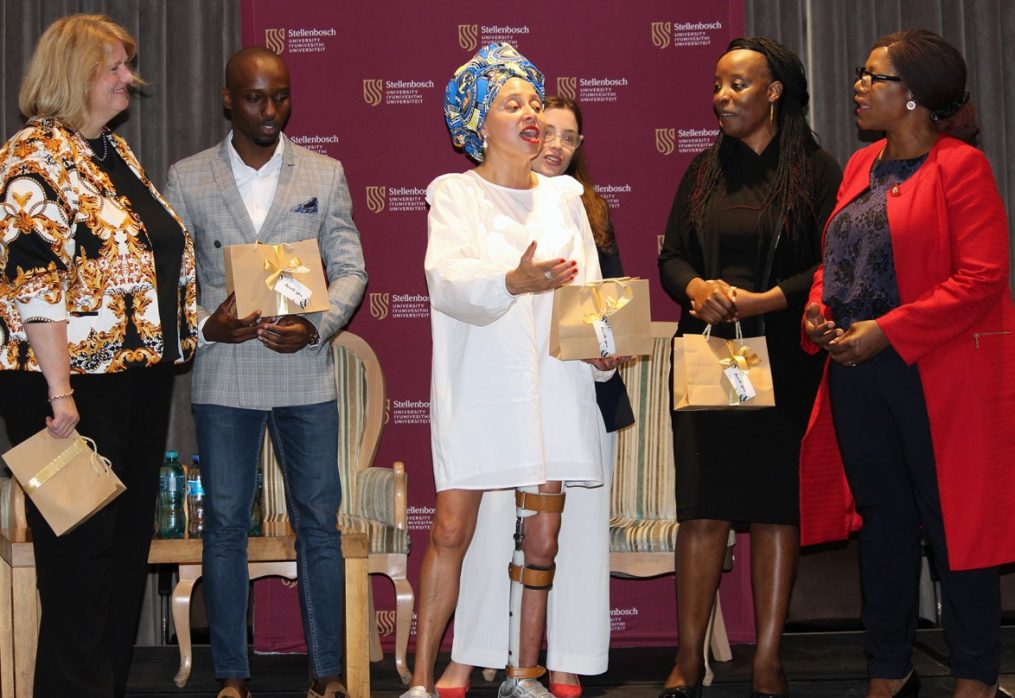SOCIAL JUSTICE: The good fight – business sector hailed as a vital partner on SA’s long road to a just society
When societies have gone through times of crisis, whether because of war, disease or other adverse factors, “good people” within business have stepped up and found solutions to social problems in partnership with civil society. There was a need to shine light on those instances, said Professor Thuli Madonsela, and explore how such synergies could be strengthened and scaled.
Madonsela, director and Law Trust Chair at the Centre for Social Justice (CSJ) at Stellenbosch University (SU), was speaking to Daily Maverick in the lead-up to the fourth Annual International Conference on Social Justice, held at the Artscape Theatre Centre on 11 October. The fifth Annual Social Justice Summit was held at the same venue the next day. The CSJ hosted both events under the theme, “The Role of Business and Civil Society in Advancing Social Justice”.

Professor Thuli Madonsela, director and law trust chair at the Centre for Social Justice at Stellenbosch University, speaks at the fourth Annual International Conference on Social Justice, held at the Artscape Theatre Centre in Cape Town. (Photo: Tamsin Metelerkamp)
“The traditional mentality has been an understanding that the business of business is business, and that means profit… and shareholder interests at all costs. However, I think when society globally has been devastated, there’s always been an understanding of the interconnectedness of humanity and the need for business to invest in ecosystem advantage,” said Madonsela.
“My vision for a successful conference… and summit would be… a buy-in by more stakeholders for the idea of this integrated action plan to accelerate social justice, the Musa Plan for Social Justice.”
The plan, which is the flagship project of SU’s Law Trust Chair, aims to “catalyse progress toward social justice, focusing on ending poverty and breaking the back of structural inequality by 2030”, in line with the National Development Plan, Agenda 2063 and the global Sustainable Development Goals.
Creating viable ecosystems
Madonsela said most companies recognised that the old, exploitative model of doing business was unsustainable in a globalised environment. Whereas before, businesses could move from one region to another to escape problems, now it is known that certain issues, such as climate change and forced migration, transcend borders.
“Also, businesses are looking for markets. These ecosystems are not just ripe for supplying labour and raw materials; they are also good as markets. Therefore, if you want a viable market, then you’ve got to invest in a viable and sustainable ecosystem. What does that mean? It means investing in people’s well-being,” she said.
[People] worry that if we galvanise civil society to solve problems, we’re letting government off the hook, but it’s not so.
“We’re not suggesting everyone does everything, but [that] each one will contribute according to their ability in their sector… It creates an ecosystem outside your business that feeds your business by ensuring a stable environment.”
The results of the 2023 Edelman Trust Barometer show that business is the most trusted institution in South Africa. The survey revealed that 62% of respondents trusted business; 61% trusted non-governmental organisations; but only 22% trusted the government.

Moeletsi Mbeki, political economist, author and entrepreneur, at the fourth Annual International Conference on Social Justice, held at the Artscape Theatre Centre in Cape Town. (Photo: Tamsin Metelerkamp)
Political economist Moeletsi Mbeki, a keynote speaker at the fourth Annual International Conference on Social Justice, said trust in business was surprising given the long history of conflict between business and many sections of South Africa’s population. It was business that introduced practices such as slavery and indentured labour in the country.
“There is, however, another side to business. Business creates industries that in turn must create jobs for the people in order for those industries to function. Jobs enable the people to pay for the food, shelter and clothing that the population needs to survive,” he said.
He added that while there was a transparent, transactional relationship between business, its owners and managers, and the citizens, the relationship between the people and government, especially the ANC government, was a “great deal more complex”.
“For South Africa to move forward and become a winning nation, business and civil society leadership has a vested interest in the social justice that uplifts the poor and underclass as this is the only way to raise South Africa’s human capital index… Without raising the country’s human capital status, South Africa’s business is doomed due to lack of international competitiveness,” he said.
The approach of businesses to tackling social justice should be about achieving justice rather than being philanthropic.
Madonsela identified government corruption as a potential obstacle on the path to building up partnerships between business and civil society to tackle social justice issues.
“There is corruption, which we regard as a social injustice on its own… [People] worry that if we galvanise civil society to solve problems, we’re letting government off the hook, but it’s not so,” she said.
“The Musa plan that we put on the table has a social accountability and leadership development element that will make sure that, in fact, we will raise people’s awareness beyond where it is right now, so that people are their own eyes and ears.”

Professor Sarojini Nadar, Desmond Tutu Research Chair in Religion and Social Justice at the University of the Western Cape, at the fourth Annual International Conference on Social Justice, held at the Artscape Theatre Centre in Cape Town. (Photo: Tamsin Metelerkamp)
Informed intervention
Reflecting on the relationship between business, civil society, academic institutions and government in promoting social justice, Professor Sarojini Nadar – the Desmond Tutu Research Chair in Religion and Social Justice at the University of the Western Cape – pointed out that campaigns with good intentions could go awry if the targeted social problems were not properly understood.
She made the example of a window graphic she saw when driving behind an eThekwini municipal bus in KwaZulu-Natal in 2008. The graphic, intended as a show of support for the 16 Days of Activism against Gender-Based Violence, had the tagline, “Defending the weak”.
“The campaign is supported by a well-known supermarket chain, and this is their tagline… to address gender-based violence… While the support and intentions were noble in this campaign, their understanding of the problem was completely misplaced,” she said.
“How is it that the campaign did not recognise or understand that conceptualising women as weak is precisely what feminist researchers have been pointing out as the root cause of gender-based violence? Imagine if the campaign was on overcoming racism and the tagline was, ‘Defending the weak’.”
Read more in Daily Maverick: Marvellous to behold, nothing inside — is social justice in South Africa merely a Potemkin village promise?
Nadar said the approach of businesses to tackling social justice should be about achieving justice rather than being philanthropic. In the case of the anti-GBV campaign, for example, she said the supermarket chain should have interrogated what factors put women in positions of weakness.
“Could, for example, said supermarket chain consider that its primary workforce, made up of black women, tellers and packers, take home less than R3,500 per month? Could they consider that this is what renders them weak, and possibly unable to leave abusive marriages or relationships… because of economic dependency?” she said.
“A justice rather than a philanthropy approach would allow business to throw stones at its own houses of power disparities and economic injustices, rather than simply throwing money into campaigns and posters, and leveraging social justice language that does more for increasing its bottom line and enhancing political connections rather than alleviating gender-based violence.”

Armand Bam, head of social impact at the University of Stellenbosch Business School, at the fourth Annual International Conference on Social Justice, held at the Artscape Theatre Centre in Cape Town. (Photo: Tamsin Metelerkamp)
Nadar’s concerns were echoed by Dr Armand Bam, head of social impact at the Stellenbosch Business School, who said the public should be able to distinguish between sincere commitment to social justice on the part of business, and brand strategies aimed at enhancing image and reputation.
“We must demand authenticity and transparency from businesses. We must drive these programmes beyond totalistic gestures and see meaningful contributions to social justice. We must see business leaders and that they actually understand the causes they are involved in, rather than outsourcing these responsibilities to committees within the organisations,” he said.
If business is to work towards social justice effectively, it needs to collaborate with key knowledge producers in civil society to ensure practical action is underpinned by sound theoretical reasoning, according to Nadar.
“Praxis is a helpful concept to shape the relationship between business and civil society for social justice, because it focuses not just on practical action, but on an action-reflection cycle,” she said.
Don’t view poverty and inequality through your own eyes, because you’ll get it wrong.
“Equally, civil society – and here I include higher education institutions – needs to rethink how they frame theoretical work. If work on a theoretical level remains only at the level of the abstract, in order to meet Western scholarly standards, then we entrench the divide between theory and social action even more, and we have to take some of the responsibility for that. We must use theory in the service of social action.”

Dr Greg Munro, director of Cities Alliance, at the fourth Annual International Conference on Social Justice, held at the Artscape Theatre Centre in Cape Town. (Photo: Tamsin Metelerkamp)
Cities Alliance, a global partnership fighting urban poverty, was put forward by its director, Greg Munro, as a good example of different sectors working together to achieve Sustainable Development Goals. The network includes academic institutions, governments, businesses and civil society organisations across the world.
“We’ve worked in probably 176 cities in over 80 countries… Lesson one – don’t view poverty and inequality through your own eyes, because you’ll get it wrong. Lesson two, the communities must be involved and included in charting their own [solutions],” said Munro.
He pointed to the private sector, including small, medium and micro enterprises, as a vital partner in tackling poverty and inequality.
“The only way to move to some… achievement towards SDGs is for national governments and civil society, large and small business, and communities… to work in collaboration. Only with that can we have any hope of improving the lives of billions… of people,” he said. DM
![]()
